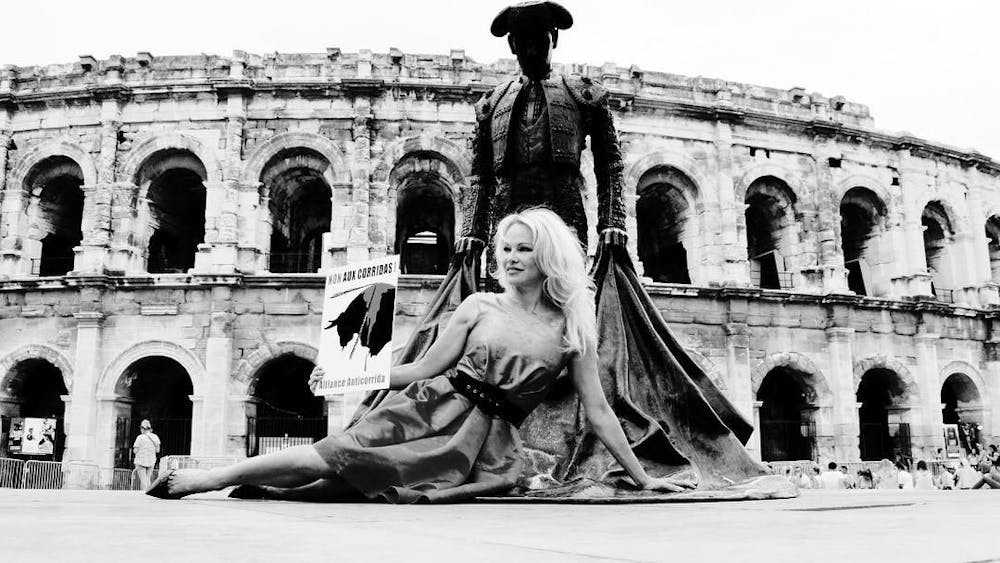A recent trailer for Hulu’s latest original limited series “Pam & Tommy” opens to a suggestive shot of a video camera staring down the audience. Aside from obviously referencing the infamous sex tape of actress Pamela Anderson and Mötley Crüe drummer Tommy Lee which the show chronicles, something about the harsh gaze of the camera brings about the feeling of guilt. This unsettling illusion of being watched even in the trailer hints to viewers that they’re about to witness — something neither of its subjects intended them to see. Anderson’s refusal to involve herself in any aspect of the series’ production is cause for further concern among those tuning in.
Without approval from Anderson — the woman whose personal life the show dramatizes — the question of whether its release repeats history becomes apparent. Based on real events explored in-depth in a 2014 Rolling Stone article, “Pam & Tommy” enlists Hollywood stars Lily Evans and Sebastian Stan to portray Anderson and Lee, respectively.
Seth Rogen plays the disgruntled contract worker who stole the couple’s sex tape, which quickly attained the status of cultural obsession once uploaded to the internet in 1997. Interestingly, Rogen’s role as series developer alongside Evan Goldberg parallels his on-screen persona — both capitalize on the pain inflicted on Anderson when an intimate moment becomes public fodder.
“Pam & Tommy” comes on the heels of recent dramas like “Impeachment: American Crime Story” and documentaries such as “Framing Britney Spears,” which seek to restore the images of women who found themselves villainized by the media throughout the late 1990s and early 2000s. The series director, Craig Gillespie, is even the mastermind behind “I, Tonya” — the 2017 film focused on notorious figure skater Tonya Harding — created with Harding’s express permission.
Of course, both Harding and Anderson are portrayed empathetically by the actresses who play them on screen. But Harding seizes at her opportunity for redemption, while Anderson reportedly feels “horrified” by the series’ creation and has said she prefers not to relive her trauma to gain public favor.
Anderson’s trauma is not limited to the exploitation of her and Lee’s stolen sex tape, which made her the butt of endless jokes cracked on platforms such as “The Tonight Show with Jay Leno.” She and Lee also ultimately signed over their copyright to the video due to the stressful impact of legal proceedings on Anderson’s pregnancy with their son Dylan. Anderson contends she never received a cent of the money earned by the video’s sales. While the show depicts this aspect with devastating gravity, its simultaneous branding as a lighthearted love story is disingenuous and harmful when one considers Lee’s abuse of Anderson — he pleaded no contest to a spousal battery charge in 1998.
Nonetheless, the distribution of Anderson and Lee’s sex tape on the internet marks a moment in public cultural history and foreshadows what’s to come in the wake of social media’s rise. “Pam & Tommy” itself stands as a testament to the rampant media sexism typical of the 1990s — a decade perhaps best remembered by the Bill Clinton and Monica Lewinsky sex scandal, which subjected Lewinsky to relentless crude jokes and media scrutiny.
A particularly emotional conversation between Anderson and Lee once they realize their sex tape was stolen and leaked depicts this reality and signifies the show’s attempt to acknowledge the outsized hate and humiliation she experienced compared to him.
“You don’t seem to understand what a big deal this is,” Evans as Anderson says. “This is worse for me.”
Although “Pam & Tommy” tries to rectify the harm done to Anderson’s reputation — Evans plays her with empathy and grace, revealing a young actress who wants to move beyond her sex symbol status and solidify her Hollywood career — the contrast between her horror and Lee’s indifference towards the show’s release suggests it falls short.
In reality, its buzz and ensuing popularity cannot place Anderson’s career back on the trajectory she once hoped to chart, which involved her transitioning from objectifying roles like “Baywatch” to more substantive ones like 1996 superhero film “Barb Wire.” Despite Anderson’s faith in the film to kickstart her movie career, critics rejected it, which proved to set back progress toward the successful career she hoped for. “Pam & Tommy” can only provide commentary on the past in hopes that the future will treat women placed in Anderson’s position more kindly, but it does so hypocritically, at Anderson’s own expense.
“Pam & Tommy” certainly isn’t unprecedented in portraying public figures without their stamp of approval. Acclaimed Netflix series “The Crown” tackles in broad strokes the misogyny faced by female members of the royal family and scandals such as Prince Charles’ affair with Camilla Parker Bowles, but similarly lacks the endorsement of the Queen or royal household. The Duke of Cambridge himself has reportedly expressed discontent with the show’s latest season, which he views as exploiting his parents — particularly the late Princess Diana, whose devastating life has repeatedly been explored in film and television.
Similarly, Madonna voiced her disapproval of a film previously in development at Universal Pictures titled “Blonde Ambition” on Instagram, claiming only she can tell her story. In stark contrast to Anderson’s situation, the film has since been scrapped and Madonna will direct and produce her own biopic for Universal. Madonna’s role reversal raises the question of whether empathetic storytelling is a fair substitute for agency over one’s story, and whether one’s story can even authentically be told without their consent.
Ultimately, waiting for Anderson to tell her story when she’s ready would restore her control over an aspect of her life stolen from her — “Pam & Tommy” only rehashes the past without learning from it.







